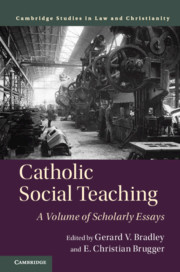Book contents
- Catholic Social Teaching
- Law and Christianity
- Frontispiece
- Catholic Social Teaching
- Copyright page
- Dedication
- Contents
- Contributors
- Acknowledgments
- Abbreviations
- Introduction Contingency, Continuity, Development, and Change in Modern Catholic Social Teaching
- Part I Historical Background
- Part II Leo XIII to Francis: The Documentary Tradition
- Part III Themes in Catholic Social Teaching
- Part IV Evaluative and Critical Reflections
- Bibliography
- Index of Names and Subjects
- Index of Ecclesiastical Texts
Part II - Leo XIII to Francis: The Documentary Tradition
Published online by Cambridge University Press: 12 July 2019
- Catholic Social Teaching
- Law and Christianity
- Frontispiece
- Catholic Social Teaching
- Copyright page
- Dedication
- Contents
- Contributors
- Acknowledgments
- Abbreviations
- Introduction Contingency, Continuity, Development, and Change in Modern Catholic Social Teaching
- Part I Historical Background
- Part II Leo XIII to Francis: The Documentary Tradition
- Part III Themes in Catholic Social Teaching
- Part IV Evaluative and Critical Reflections
- Bibliography
- Index of Names and Subjects
- Index of Ecclesiastical Texts
Summary
This chapter is an analytical summary of Rerum novarum. Its goal is to illuminate the purpose of the encyclical and the main lines of Pope Leo’s reasoning, his key premises and central ethical conclusions, and in this way, to articulate as clearly as possible the teaching that comprises Rerum novarum. Rerum’s influence on Catholic teaching and practice is most manifest in the Church’s “social teaching,” which in various ways identifies the encyclical as its founding statement. This identification is made in the names and citations of some of the most important papal contributions to Catholic Social Teaching (CST) and is pervasive throughout the corpus of CST. And it is revealed in the ways in which the accepted principles of CST are present or anticipated in Rerum novarum. Although the chapter does not undertake the large and formidable task of characterizing CST, it does indicate how these principles figure in Pope Leo’s analysis. It also underlines the extent to which these principles are not the main point of Rerum novarum, but stand in the service of the moral and religious reform urged by Pope Leo.
Keywords
- Type
- Chapter
- Information
- Catholic Social TeachingA Volume of Scholarly Essays, pp. 67 - 232Publisher: Cambridge University PressPrint publication year: 2019

